




Inquiry leads learning at Baxter Academy for Technology and Science, a public charter high school free to students. Our project-based STEM curriculum emphasizes real-world problemsolving and is paired with a humanities program that connects ideas across disciplines and cultivates strong communication skills. Students design innovative projects through Flex Friday, a unique program requiring initiative, perseverance, and collaboration, as well as reflection on the work and its impact on the community.
Baxter Academy is a rigorous college and career-preparatory high school promoting student ownership of learning. We serve students with a strong interest in science, technology, engineering, and math (STEM); we teach deep commitment to the community. Students study complex, real-world problems, using and building technological tools in a collaborative environment with scientists, engineers, and other professionals. The school sets high expectations for all students, promotes innovation and creativity, and produces graduates with a 21st-century global perspective. A Baxter student's academic journey is guided by standards for Science, Design, Mathematics, and Humanities. The school's engaging and challenging curriculum is taught by innovative teachers, who help guide students to be passionate, self-directed learners. At Baxter, student inquiry is supported by technology-rich project-based learning. Baxter was founded in 2013 and is located in the largest Maine urban center, which provides partnerships and resources to connect student learning with realworld work and needs. Our campus sits next to the tidal basin Back Cove, which is a green space with 3 miles of trails used for oceanfront walking and biking.


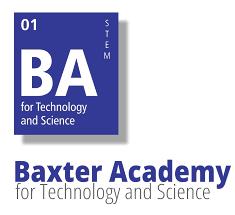
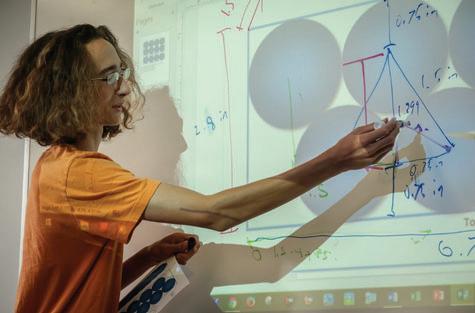
These are some ways attention to academic norms looks like for students.
I manage commitments and time well for positive social and emotional well-being, and will not have a backlog of work or accrue overdue deadline debt.
I respect my educators who carefully design learning opportunities that are sequenced and responsive to my learning needs and timed for right feedback early enough to help me grow.
I value honest and helpful feedback from my educators and peers and use it to recalibrate my academic performance to reach my ambition and potential.
I am empathetic when I give feedback to others.
As Baxter students, your hard work and commitment to your growth and the growth of our Baxter learning community make us a great school.
As a college preparatory school, we hold these academic high-expectation norms for our community:
Students carry obligations to the community.
Showing up for each other -Do I show engagement during class times or other learning gatherings? Do I actively engage in teamwork when called upon and even step up to lead?
Preparation- Am I clear about what I need to come to the next class as a member of my learning community?
Deadlines & Expectations- Am I meeting deadlines and expectations, and holding myself accountable for what I am responsible for?
Discourse & Communication - Do I engage in discourse (listening, sharing, and facilitating) and practice professional norms of respectful and clear writing communication?
Care for peers- Am I self-aware and groupaware in learning environments? Am I practicing positive social management?
Students carry obligations to self.
Responsible for meeting commitments- How do I maintain positive social-emotional wellness, including by not accruing over-due deadline debt?
Heterogeneity (Self Acceptance) - Do I accept myself for my unique character and needs, but also understand that I live, serve, and work in a community?
Advocacy - How do I identify the help I need, know where to look, and ask for it?
Note-taking- How do I maintain records and process notes for my learning so that I can take ownership of my learning?
Study skills for assessments- How do I structure a way to hone my knowledge and skills for upcoming presentations of my work?
A Baxter student will take foundational core courses and will select courses that target their areas of interest, especially as they become Junior and Senior students. Generally, a third of a student's academic program consists of core Baxter courses; our program offerings are rich with STEM and additional academic options to tailor the student's journey to their exploratory and focal interests. A minimum enrollment of 5 courses during each semester of school is required, except with the express approval of the school's administration. Class of 2027 and earlier should refer to the 2023-2024 Course of Studies.
4 years of Flex Friday and Advisory
4 years of Mathematics
4 years of laboratory science study
3 years of Humanities
1.5 years of Design
1 year of Fine Art
World Language to level II at minimum
3 years of Electives at minimum
Mathematics Stem Math & Alg Accel Math I
Geo and/or Alg 2 Accel Math II
Alg 2 and/or Geo PreCalc/Calc Stats/PreCalc, Calc Diff Equations
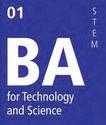
Baxter students may choose to explore or concentrate in a variety of STEM areas.
9th Art Fund CAD, Exp Engin
10th Exp Engineer Comp Sci
11th
12th
Marine Biology Housing Oceanography Advance Bio
Adv Chem Ecology Genetics Digital Art
Fund
Exp Engin
Drawing I/II Music Comp Exp Engineer
Engineering I Comp Sci CAD, Art Fund Comp Sci Exp Engineer
Graphic I/II Digital Art Ensemble Printmaking Comp Sci Programming Adv Bio/Chem
Animation Illustration Architecture
Schedule of a 9th grade student:
Advanced Eng Calc Physics
Human AP Sci, Tech, Ethics
Housing Fabric Design Architecture Programming
Art Fund, Comp Sci Composites
Ecology Calc Physics
Human A&P Adv Chem
In their first year, Baxter students enroll in a core curriculum for math, science, humanities, world language, and design. See above for some possible courses of study for students with particular areas of interest. Student Flex Friday programs can be tailored to student inquiry, supported by a Baxter educator as a coach; we encourage student Flex Friday projects to be collaborative.

BA students commit to a rigorous academic journey and perform with clear expectations. Through their classes, students gain content and skills. These expectations, as named by standards, have overlaps across the curriculum and allow a student to pursue increasing rigor.
Algebra Functions
Seeing Structure in Expressions Creating Equations Reasoning with Equations and Inequalities Arithmetic with Polynomical & Rational Functions Complex Number System
Interpreting Functions Building Functions Modeling with Functions
Geometry & Spatial Reasoning
Conguence
Similiarity, Right Triangles, Trigonometry
Expressing Geometric Properties w/ Equations
Geometric
Measurement & Dimension
Statistics and Probability
Interpreting Categorical and Quantative Data Making Inferences and Justifying Conclusions
Conditional Probability & Rules of Probability
Probability in Decision Making
Force and Motion Matter & Energy
F&M Sci & Engineering Practices
F&M Cross Cutting Concepts Interactions
F&M
M&E Sci and Engineering Practices
M&E Crosscutting Concepts Reaction Structure
Heredity & EvolutionClimate Change
H&E Sci & Engineering Practices
H&E Crosscutting Concepts
Inheritance & Variation Structure, Function & Development
CC Sci and Engineering Practices
CC Crosscutting Concepts Cycles Systems
WritingResearchSpeaking and ListeningReading
Voice, Audience, Style Conventions
Cohesion/ Organization Development Ideas
Appication Infortmation
Gathering Inquiry
Presentation Discussion
Craft and Structure
Key Ideas and Details
Citing Evidence
Design Process
Analyze Optimize Develop Solutions Identify Problems
Computer Science CADEngineeringFabrication
Code Design Information Technology Professional Practices Programming Techniques
Modeling Simulation Design Process Modeling Math & Computer Science Theory Manufacturing Craftsmanship Tools Materials
Civics & GovernmentEconomicsHistorical Context
Policy Making Process Civics Government Historical Economics Understanding Economic Systems Money Management Historical Thinking
Interpersonal CommunicationInterpretive CommunicationPresentational Communication
Interpersonal Communication Listening Reading Speaking Writing
Asthetics & Meaning
Visual Arts Content, Visual Arts Tools or Composition & Performance
Language for Social and Instructional Purposes (Design Dept., Advisory, English Intensive)
Language for Language Arts Language for Mathematics
Language for Science Language for Social Studies Narrate Inform Explain Argue Narrate Inform Argue Explain Argue Explain Argue Explain Argue
If you plan to go to a four-year liberal arts college, you should consider these electives:
Full-year lab science courses
Humanities electives in English & Social Studies
World Language through level 3 and beyond (A sequence of one language is preferred, and schools rarely allow meeting this requirement with only a single year of language study.)
Additional concentration and exploration electives in the highest rigor right fit courses for you- this means reaching for additional 300 and 400-level courses.
If you are planning to attend a science or engineering college, you should take these electives:
Strong selection of Math and Science Courses
including full-year lab science
Humanities English & Social Studies
World Language through 300 level and beyond (A sequence of one language is preferred, and schools rarely allow meeting this requirement with only a single year of language study.
Additional concentration and exploration electives in the highest rigor right fit courses for you- this means reaching for additional 300 and 400-level courses.
If you are planning to go to a two-year college or technical school, you should consider these electives:
Humanities English
Continued Math Studies
Dual Enrollment
Get College credit at Baxter Academy!
Students who have achieved advancing in standards may consider dual enrollment through our partnering universities for up to 12 college credits.
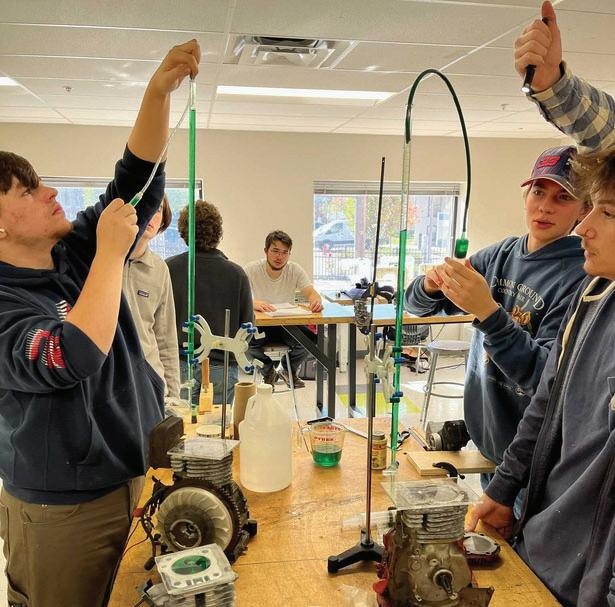
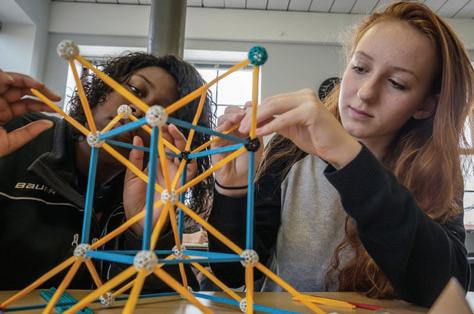
Qualified Juniors and Seniors may work at an internship through our Flex Friday program that gives insight into a career or academic focus.
Students who have achieved advancing in standards may consider dual enrollment through our partnering universities for up to 12 college credits.
Learning mathematics at Baxter Academy is deeply rooted in inquiry and problem-solving. Students build and expand their mathematical understanding and abilities, as well as make connections to prior mathematical knowledge and other subjects or disciplines. Baxter teachers strive to engage students in interesting and challenging mathematics that will prepare them for future study. Baxter students take a minimum of 4 full years of Math with the option for additional study.
Competency Benchmark gives access to upperlevel courses
I Algebra 2
2
Standards in Math
*Students may enter 9th grade placed in this course
Precalculus (fy)
2D Geo 3D Stats Adv Stats
Acc Alg, Trig, Stats (fy)*
Personal Finance
An integrated math and science course for incoming 9th grade students to build skills in algebra, functions and statistics. Topics include applications of linear functions, quadratic functions, data collection and analysis, and right triangle trigonometry. Students will be expected to collect data, use appropriate functions to model the data, and create and solve equations to make predictions from the data. 9th grade students take this course alongside Physical Science. Standards Addressed: EN in Algebra, Functions, & Statistics.
MAT 201
This course follows STEM Math and is designed for students who finish STEM Math at the entering level for Algebra, requiring additional time to build the skills for Math 301. Topics of study include solving systems of linear equations, linear programming, function notation, and linear and exponential functions. Standards Assessed: PR in Algebra & Functions.
Acc Geo/Pre Calc/Stats (fy)
Calculus (fy)
Diff EQ, Linear Alg (fy)
This course is for students with strong Algebra 1 skills who are ready to accelerate in math as 9th grade students. The focus of the course will be solving algebra problems by algebraic manipulation as well as by graphical methods. The primary skills to be developed include: multiplication of polynomials, factoring, simplification of algebraic fractions, properties of roots, solving linear, quadratic, and irrational equations, together with the corresponding word problems. The elements of the theory of functions, algebraic geometry, and trigonometry will be covered, with occasional problems in the geometry and trigonometry of triangles and circles and some basic statistics. Exceptionally challenging problems will be provided for interested students. This course is in place of MAT 100, 201, 301, and 323. Prerequisites: Strong algebra background and recommendation of Baxter mathematics faculty. Standards Assessed: CB in Algebra & Functions, PR in Statistics.
MAT 301
This course follows STEM Math in the Algebra and Functions sequence. Designed for students who finish the STEM class at the progressing level for Algebra. Topics of study include quadratic functions and applications, solving quadratic equations, finding different forms of quadratic functions, and working with zeros and factors. Additional work with polynomials and complex number solutions to quadratic equations will be introduced as time allows. This course may be taken concurrently with MAT 315. Prerequisite: PR in Algebra. Standards Assessed: CB in Algebra
MAT 323
Students continue learning about families of functions and the algebra supporting them. Function families will extend from the familiar linear, exponential, and quadratic to rational, polynomial, absolute value, and square root. Function families will be developed, explored, and applied to appropriate contexts. Prerequisites: PR in Functions, CB in Algebra & Geometry. Standards Assessed: CB in Functions & Algebra.
MAT 315
Geometry is the study of shape and size. This class will focus on properties and definitions of one- and twodimensional shapes : lines, angles, polygons, and circles. Geometric transformations using coordinate geometry lead to concepts of congruence and similarity and lay the foundation for transformation of functions in MAT 400. Familiar geometric theorems will be explored and proven using deductive reasoning. This course may be taken concurrently with MAT 301. Prerequisite: PR in Algebra. Standards Assessed: CB in Geometry.
MAT 410
Students will extend their knowledge of geometry by investigating the three-dimensional analogs of twodimensional concepts. This includes the properties of three-dimensional shapes, creating orthogonal and isomorphic projections, and applying their learning to architectural and design situations. Students will study the effects of scaling up or scaling down and how to fill or pack space efficiently. Students will extend their understanding of symmetry by visualizing slices through objects and analyzing the shape of the resulting slice. Prerequisite: CB in Geometry. Assessed: AD/EX in Geometry.
MAT 330
This course will include statistical studies and survey techniques. Topics include a review of descriptive statistics, normal distributions, types of statistical studies, random variables, sampling distributions, confidence intervals, hypothesis testing, two-way tables, and conditional probability Students enrolled in this course are eligible for 3 credits from Thomas College through dual enrollment. Prerequisites: PR in Algebra. Standards Assessed: CB in Statistics.
MAT 435
Students will deepen their learning of statistics by creating statistical models and analyzing how well those models represent the data. Extended methods of statistical inference will be explored. Additionally, students will learn the basics of R programming, a language developed by statisticians for the purposes of statistical analysis. Prerequisite: CB in Statistics. Standards Assessed: AD/EX in Statistics.
MAT 355
The focus of this course is understanding the events in each student’s life that will impact them financially. Students will use algebraic and graphical analysis to assess their costs, their sources of income, and how to build a solid financial future. Major projects for this course will focus around understanding job markets and the costs and benefits of college, creating and managing a budget, and planning for taxes and retirement. Throughout the course, students will practice algebraic thinking and create, use, and interpret linear and exponential functions as models for financial situations. Prerequisites: CB in Algebra. Standards Assessed: CB for Research, Economics, & Functions.
MAT 400, Full Year
Intensive review of function families with the addition of trigonometric, logarithmic, parametric functions, and function inverses. Students will use algebraic manipulation to solve equations involving polynomial, trigonometric, exponential, logarithmic, and rational functions. The mathematics of complex numbers will be developed and applied in algebraic and geometric contexts. Topics will also include a careful look at conic sections (circle, ellipses, parabolas, and hyperbolas) from their geometric definitions and extending their algebraic representations. Prerequisites: CB in Algebra, Functions, and Geometry. Standards Assessed: AD in Algebra, Functions, and Geometry.
MAT 401, Full Year
This course is a study of advanced algebra, trigonometry, geometry, and statistics. The goal is to prepare students for calculus, while boosting their problem solving ability and their written and oral mathematical presentation skills. The first few weeks of the course will be used to consolidate student’s skills in algebraic manipulation, including advanced algebraic simplification and the solving of linear and quadratic equations and word problems. Precalculus topics will include: the elements of number theory, polynomials, rational expressions, trigonometric functions and identities, inverse trigonometric functions, exponential and logarithmic functions, solution of trigonometric, exponential, logarithmic, and irrational equations. Problems in two-dimensional and three-dimensional geometry will be incorporated into daily work. Statistics material (mean, variance, standard deviation, correlation, regression, chisquared test, t-test) will be coordinated with concurrent science courses. A very strong algebra foundation is a prerequisite. This course follows MAT 340 and covers same material as MAT 315, 330, and 400. Prerequisites: Successful completion of MAT 340 or CB in Algebra & Functions. Standards assessed: AD Algebra & Functions, CB Geometry & Statistics
MAT 500, Full Year
Calculus introduces the concept of limit and applies it to the definition of derivative and integral of a function of one variable. The rules of differentiation and properties of the integral are emphasized, as well as applications of the derivative and integral. Additional topics include techniques of integration, indeterminate forms and L'Hôpital's Rule, improper integrals, infinite series, conic sections, parametric equations, and polar coordinates. Prerequisites: AD in Algebra, Functions & Geometry. Standards Assessed: EX in Algebra, Functions & Geometry.
MAT 500, Full Year
A year-long introduction to topics that are typically covered in the first two years of college. The course will emphasize first and second order differential equations, and advanced problem solving with matrices and determinants. Standards Assessed: BA in Functions & Algebra.
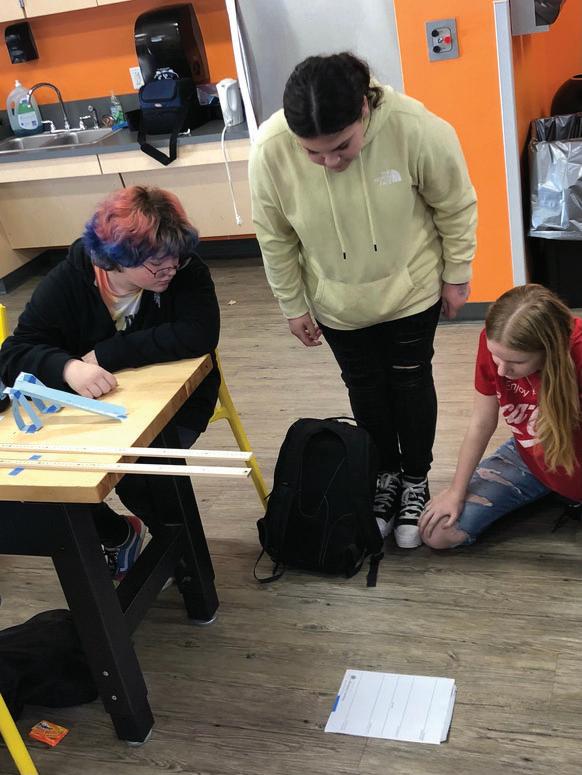

The mission of science instruction at Baxter Academy is to prepare our students to be knowledgeable, scientifically literate, responsible citizens and problem solvers in an increasingly complex, dynamic, and interconnected world. We seek to build upon a fundamental understanding of all scientific fields by nurturing student curiosity, disciplined inquiry skills, and understanding science in a real-world context. Baxter students build foundational practices and knowledge by reaching competency in chemistry, biology, physics, and climate and earth systems according to NGSS standards. During their junior and senior years, students have a wide variety of elections to explore or concentrate on, such as engineering, engineering, or life science for their future college and career. Throughout students progression at Baxter, they will be challenged to complete labs, record findings, and walk through the scientific process from start to finish.
Competency Benchmark gives access to upper level courses

Starting with the Class of 2028, all 9th grade students will be take these first year courses.
SCI 101
A lab-based science course for incoming 9th graders that serves as an introduction to physics and chemistry. Topics covered include chemical reactions, physical properties, acid/base chemistry, linear motion, kinematics, and gravity. Standards assessed: PR Forces & Motion, Matter & Energy.
SCI 201
This course is designed to introduce students to the fundamental concepts of life science and illustrate the application of these principles. The curriculum will focus on actively engaging students with the world around them using the scientific method as the basis of discovery. Topics include the building blocks of life, cell biology, cellular processes, and transcription and translation. Standards Assessed: PR Heredity & Evolution, Climate & Earth Systems.
Core Sciences: All students will be at competency benchmark upon completing these courses.
SCI 355
Biology provides students with a comprehensive introduction to patterns of inheritance, diversity of life, populations and communities, and the Biosphere. Lab based inquiry will be enforced through experimentation while highlighting data collection and analysis. Interactions among organisms and their biophysical environment will be an overarching theme throughout this course. Standards Assessed: CB Heredity & Evolution.
SCI 360
A lab course focused on the basics of chemistry. The course will cover ionic reactions, stoichiometry, electron configurations, precipitation reactions, models of the atom and periodic trends. A semester course focused on the connection between chemistry and our impact on earth. Students will be connecting their knowledge of chemistry to learn about and propose solution surrounding alternative energy sources. Standards Assessed: CB in Matter & Energy.
SCI 365
An introductory course to core concepts in physics. Optics, electromagnetism, electricity, optics, and forces and motion will be covered throughout the semester. Standards Assessed: CB Forces & Motion.
SCI 370
Students will investigate and study the interactions between the four major Earth spheres including the geosphere, atmosphere, hydrosphere, and biosphere in order to explain Earth’s formation, processes, history, landscapes, and how and why Earth changes over time. Standards Assessed: CB Climate & Earth Systems.
Prerequisites for the courses below include competency bench mark in Core Sciences.
SCI 420
In this course, students investigate the storage of genetic information in DNA, its transmission from cell to cell and from generation to generation, and its expression during protein synthesis. Students investigate patterns of inheritance for various traits using principles of Mendelian and molecular genetics. Students also investigate the application of biotechnology for meeting human needs in the areas of genetics, reproduction, development, and evolution. Standards Assessed: AD Heredity & Evolution.
SCI 425
Students will learn about the immune response, the cell biology of the immune system, the nature of antigens, antibodies, B and T cells. The nature of tumor immunology and cancer development will also be covered, with an emphasis on the role of the immune system to maintain homeostasis in an organism. Standards Assessed: AD Heredity & Evolution, Matter & Energy.
SCI 430
An algebra-based physics course covering a wide range of classical and modern physics concepts. Topics include: Optics, electromagnetic radiation, orbital dynamics, stellar evolution, and cosmology. Standards assessed: CB/AD in Forces & Motion
SCI 435
This course addresses the EQ?s through the lens of Maine’s varied and complex ecosystems. Students will learn about ecological relationships, as well as the ways in which energy, matter, and information flow within and between ecosystems. There will be an emphasis on identifying and addressing ways in which humans can alter their impact on the environment. Standards Assessed: CB/AD Heredity & Evolution, Climate & Earth System.
SCI 440
This chemical engineering course will focus on clear energy and energy transformations. By studying chemical reactions, we will learn how to create sustainable energy. We will discuss methods for converting matter from one source to another with out creating net positive carbon output. We will also analyze the structure of various materials. Standards Assessed: CB/AD for Forces & Motion, Matter & Energy
SCI 445
Human Anatomy and Physiology is a lab course that investigates the forms, processes, and systems of the human body. Students will study the basic organization of the body, the biochemical composition and interactions, the parts of the major body systems as well as how they work together. Case studies of infectious and genetic diseases and current discoveries in medicine will enhance our study. This class is designed for students who are interested in the health field and for students who want to learn more about their bodies and how to maintain a healthy lifestyle. Standards Assessed: CB/AD Heredity & Evolution.
SCI 450
Marine biology focuses on life in the ocean. This course introduces students to the many types of plants and animals that live in the ocean, on a macro level. It will have an ecological approach that will emphasize the big picture and the relationship between all organisms and how they are suited to live in their habitats, specifically Maine. An ongoing focus throughout the year will be the impacts of climate change on the oceans, and what our environmental impact has been. Laboratory activities reinforce the concepts and principles stated, as well as field trips, dissections, projects, and independent research. Specific topics covered are fishes, marine mammals, and specific marine habitats. Standards assessed: CB/AD in Heredity & Evolution, Climate & Earth Systems.
SCI 455
Marine biology focuses on life in the ocean. This course introduces students to the many types of plants and animals that live in the ocean, on a micro level. It will have an ecological approach that will emphasize the big picture and relationships between all organisms and how they are suited to live in their habitats, specifically in Maine. An ongoing focus throughout the year will be the impacts of climate change on oceans, and what our environmental impact has been. Laboratory activities reinforce the concepts and principles stated, as well as field trips, dissections, projects, and independent research. Specific topics cover water chemistry, plankton, and invertebrates. Standards assessed: CB/AD in Heredity & Evolution, Climate & Earth Systems.
SCI 460
This course looks at traditional physics questions from the view of ocean sciences. The interaction of matter and energy leads to the integration of organic and living systems to interesting to aspiring oceanographers. Standards Assessed: CB/AD Forces & Motion, Climate & Earth Systems.
SCI 465
This course will introduce students to the dynamic and complex weather and climate systems they have witnessed everyday of their lives. Meteorology will focus on the microsale events that create our local weather patterns and the macroscale phenomena that cause major weather events, such as cyclones, tornadoes, and lightning. Lab investigations will explore pressure, heat, and humidity in the classroom, as well as weather monitoring and data collection
SCI 360
This interdisciplinary course explores the natural intersection between. music and physics through an understanding of sound waves, music theory, and the cultural differences that surround this intersection. Standards assessed: CB/AD forces & motion, music, and aesthetics, meaning.
SCI 400, Full year
A lab science course for students who have the desire to explore advanced biology topics at the advancing and excelling level. This course will focus on topics at the intersection of molecular biology, ecology, microbiology, genetics, biochemistry, physiology, biotechnology, and developmental biology. Prerequisite: Life science, Biology. Standards Assessed: Heredity & Evolution AD.
SCI 405, Full year
A course for students who have demonstrated ability at the benchmark level or above and wish to explore advanced chemistry topics through laboratory investigations. This course will focus on reaction kinetics, equilibrium, predicting products of reactions, redox reactions, thermodynamics, and an introduction to organic chemistry. Prerequisite: Chemistry and Chemical Engineering. Standards Assessed: AD Matter & Energy.
SCI 410, Full year
A calculus-based physics course aligned to the first semester of a college physics course. The focus is on solving challenging mechanics problems, to prepare students to be successful in a first-year college physics course. The course will include some labs, with an emphasis on error analysis. Prerequisite: Calculus and CB in Forces & Motion. Standards Assessed: AD/EX in Forces & Motion.

These titles below are for Class of 2027 and older.
SCI 350, Full year
A lab course focused on the fundamentals of Biology. Topics that will be covered include cellular structure, genetics, inheritance, natural selection in populations and ecosystems, and interactions between these systems. Standards Assessed: AD in Heredity & Evolution and Climate & Earth Systems, CB in Statistics.
SCI 361, Full year
A lab course focused on the basics of chemistry. The course will cover ionic reactions, stoichiometry, electron configurations, precipitation reactions, models of the atom, and periodic trends. This course continues onto nuclear chemistry, thermodynamics, kinetics, and predicting the products of reactions. Students will conduct demonstration, inquirybased, and student-led lab investigations in Chemistry. Standards Assessed: CB-AD in Matter & Energy and Climate & Earth Systems.
Baxter’s design department is committed to preparing students with the skills and knowledge to be successful in college and career. Student work centers around two foundational goals: to creatively solve open-ended problems and to be prepared with real-world skills that go beyond the classroom. Whether creating a circuit board, writing software, or designing a robot, students learn the core skills to succeed in a constantly changing world.
Competency
Woodworking
Engineering I, II
CAD Electronics
Explore
Electronics II
Computer Science II
Fabric Design Mechanisms
Product Design
Composites
Architecture
Advanced Engineering
Advanced
Programming
Engineering
Information Tech. I,II
Baxter Academy is a unique school in that the design process is a standard for graduation. We use a model of the design process developed by Stanford’s D school as a method for teaching critical thinking, divergent and convergent thought, human-centered design, and prototype fabrication.
Our curriculum and the design process provide students with a way of breaking down the creative problem process into modes of divergent and convergent thought. We solve problems by inferring and observing problems and then create multiple solutions before landing on the final designs.
Design Standards

Carbon Fiber Bike - Flex Friday - Fablab
The Visual and Performing arts classes focus primarily on the Aesthetics and Meaning standard. All students experience art and learn to apply the elements of design in an Art Fundamentals course and then dive into deeper meaning through higher-level courses. Students may also choose to experience art through music classes where they learn to perform, respond to others, and compose original music.
Competency
Digital
Illustration
Printmaking Animation
Music courses can earn EN/CB in Music and Aesthetics and Meaning.
Project-based learning is the basis for almost all assignments in the Design department. The curriculum is often formulated around students’ interests. Although there are times in a class like Intro to Design where all students are asked to create a wooden letter to teach hand tool use, even the intro classes are soon asked to design and build a model of a chair. Students start with a blank sheet of paper, interview chair users, make observations, measure or research ergonomic constraints, etc. The end result is a class with 20 students and 20 versions of a chair.
DES 200
An introduction to the Design Thinking process, engineering, and fabrication concepts and practices. Standards Assessed: EN in Speaking & Listening and PR Fabrication, PR in the Design Process.
DES 206
In this class, we learn how to use CAD and how to unitize it as a Design Tool. We will start by learning foundational tools, and then move on to more creative design problems. We will also learn the fundamentals of Euclidean geometry through design projects that use CAD. Standards Assessed: PR in CAD.
DES 205
How to use engineering tools and principles to understand the world around us. This class is for students who want to understand the technology around us and to practice the engineering mindset. Standards Assessed: PR Engineering, Design Process.
DES 300, Full year
Students will learn to work through larger engineering problems. To solve these problems, students will have to apply the design process. They will learn a variety of design tools including CAD, Excel, and 3D printers. In semester 2 the problems will also explore microcontrollers and basic programming. The course will culminate in a final project where students develop solutions for a real world problem. Prerequisites: CAD, Intro Des. Standards Assessed: CB in Engineering, Design Process., CB CAD.
DES 401, Full year
Students work through independent engineering projects at an advanced level. Purpose and projects require approval from teacher. Standards Assessed: AD in Engineering, Design Process.
DES 500, Full year
The class centers around preparing students for college-level Engineering. We will study college-level problems in the areas of statics, mechanics of materials, etc. Students will work through complex problems that require them to build their design tools using programming and CAD. Students will need an understanding of Calculus. Prerequisites: CAD, Engineering I and II. Standards: EX in Design Process, Engineering.
DES 210
Learn basic electronic concepts. Use an online circuit simulator to design, build, and test electronic circuit concepts. Standards Assessed: PR in Design Process.
DES 310
This is an advanced course in Electronics that involves learning filter design, Operational Amplifier circuits, and power transistors. Standards Assessed: CB in Design Process.
DES 330
This course focuses on techniques of visualization and representation (freehand drawing skills and model making) as they pertain to beginning design. Students will explore form development and refine design skills through orthographic drawing (plan, section & elevation), perspective drawing, model making, and diagramming. Prerequisites: Intro Des. Standards Assessed: CB Design Process, CB Fabrication, PR Aesthetics and Meaning
DES 410
This full-year course will teach advanced electronics concepts using an “Internet of Things” platform, gathering real-world data from various types of sensors, sending this data up to the cloud, and then processing the data for display. Students will be able to select which concepts they want for their concentration. Standards Assessed: AD/EX in design process and computer science.
MUS ENS
Students pursure an instrument of their choice and participate in a musical ensemble to learn songs together and perform in the school and possibly outisde audiences. Our ensemble will explore various genres of music; anything students are passionate about performing. We welcome guitarists, keyboardists, violinists, DJs, singers, dummers. Students will need to provide their instrument/ gear for this class. Standards assesed: EN-CB Music and Aesthetics and Meaning.
MUS ACA
A workshop course for music lovers, a cappella will focus on group singing while improving musicality through harmonizing, daily vocal warm-ups, learning musical terms, ear training and more. We will learn contemporary music to perform a cappella based projects by the end of the semester. We’ll cover dynamics, diction, and feeling the rhythm.. but most importantly we’ll have a blast engaging with music. Standards assesed: EN-CB Music and Aesthetics & Meaning.
MUS GUI
Students will receive guidance and direction in creative problem solving related to playing the guitar at a beginning level and will learn many of the different styles, skills and techniques required to become a successful guitarist. No previous guitar experience needed. Areas of concentration include: correct posture, chart reading, aural skills, rhythmic patterns, chord study, musical forms, improvisation, and performing experiences. Standards Assessed: EN-CB Music and Aesthetics & Meaning
MUS MCT
Introduction music composition using a Digital Audio Workstation (DAW). Students are guided through a series of increasingly complex projects, putting music fundamentals into practice while building a portfolio of work. No musical experience is necessary for this course. Course may be repeated in order to work on more complex projects and topics. Standards Assesed: EN/CB Music & Aesthetics Meaning.
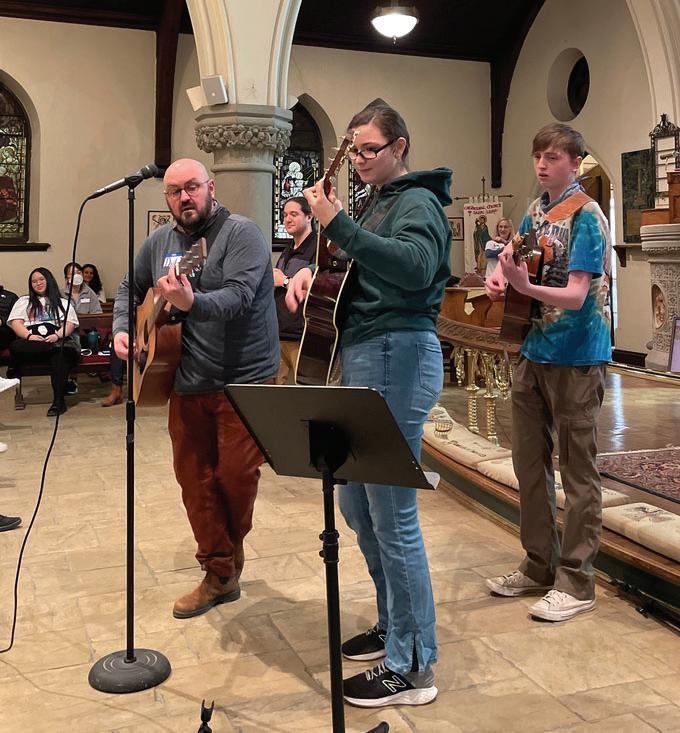
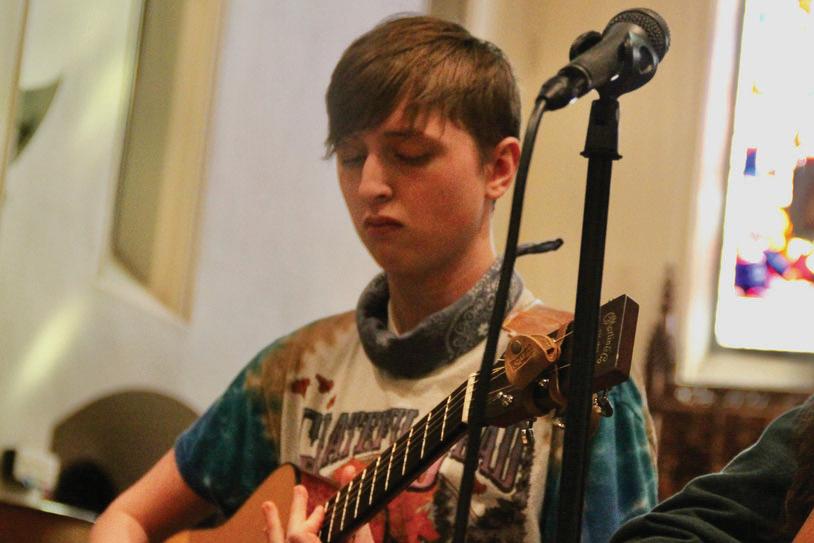

SWhat stories are at play here? P
What possibilities are here?
A
What assets do I bring?
C How does this impact the community? E
What engages my curiosity?

Baxter Academy for Technology and Science is committed to providing an equitable learning community for its students and all of its members. We value diversity in all its forms, including but not limited to linguistic, ethnic, ability, family structure, gender, race, religion, sexual orientation, and socio-economic status. We help students develop an understanding of their responsibility as active citizens in a multicultural, democratic society. Through our students, our school is an agent of change; our school is an equity project that seeks to interrupt and transform systemic equity toward a more loving, just, equitable, and peaceful world. This critical work is the ongoing responsibility of every member of our community.
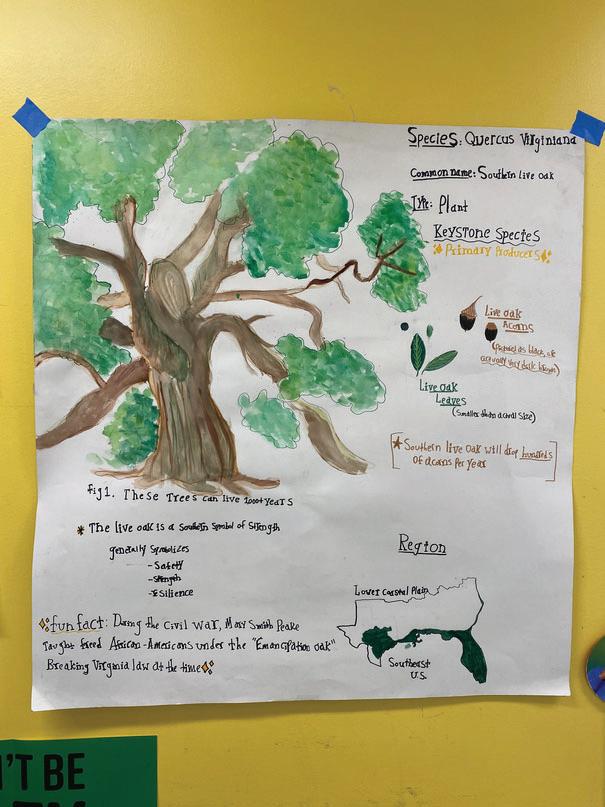


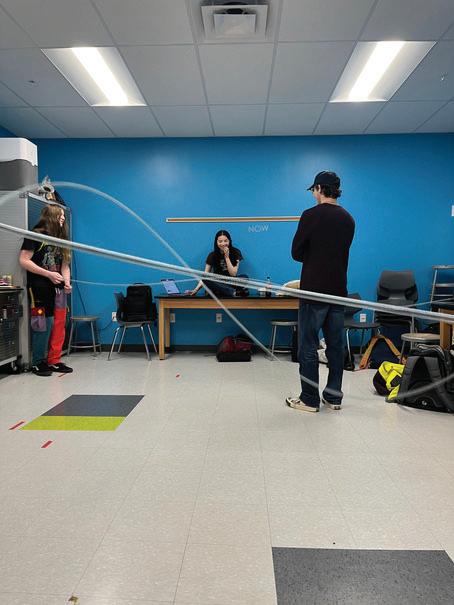
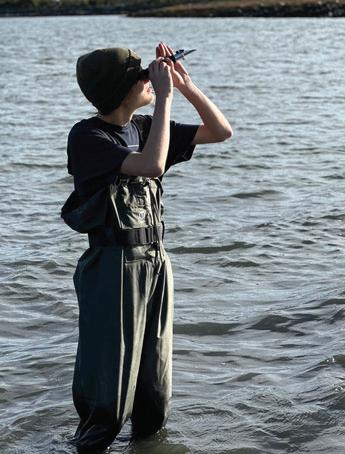
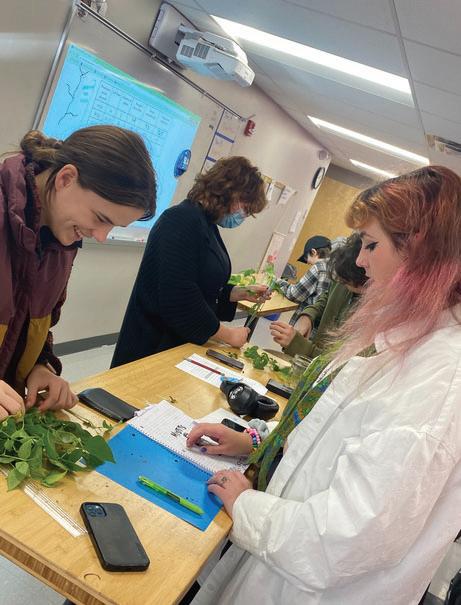





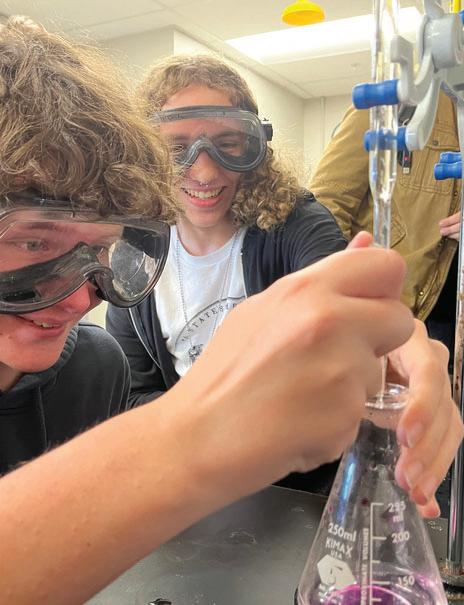
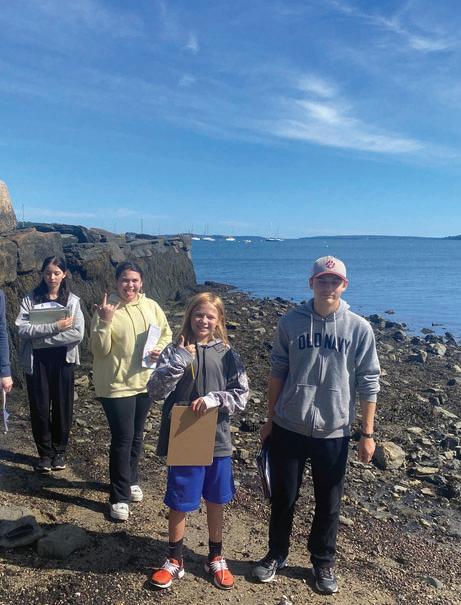
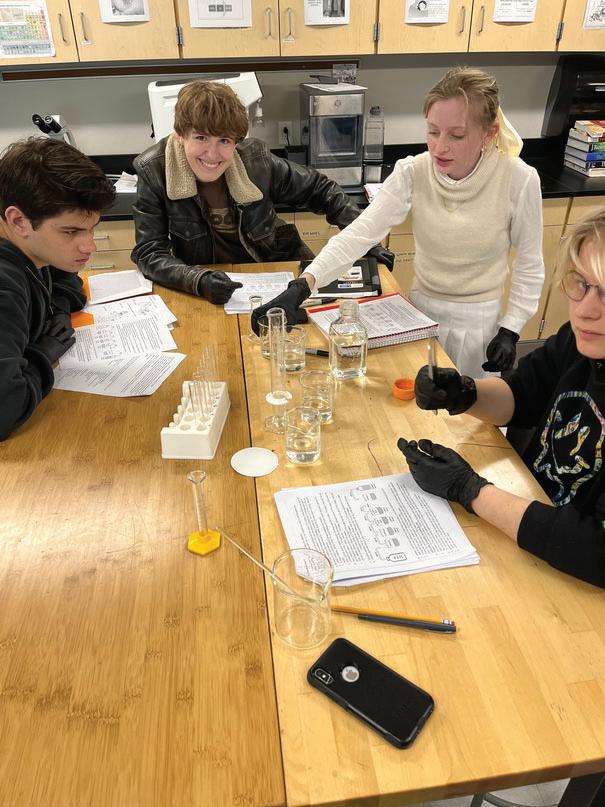
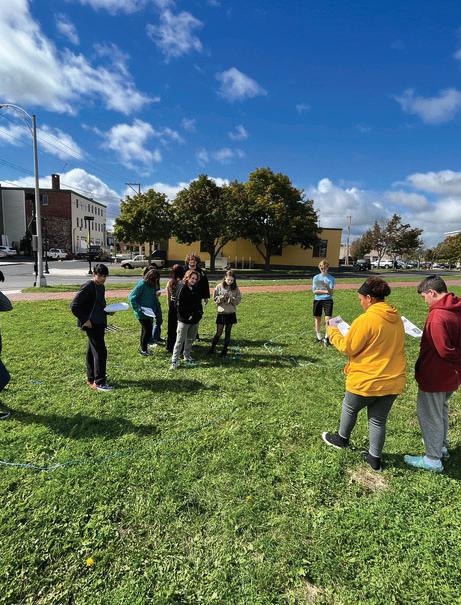
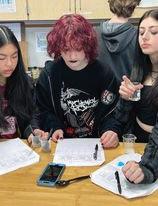
COS 201
This class is designed for students who have no prior coding experience. It teaches the basics of programming logic, discrete mathematics, coding syntax, and structure. Students will learn how to write and debug simple procedural programs which will build the skills needed for higher-level programming. Standards Assessed: PR in CS
COS 301
This course extends the basics of programming, including data structures, file I/O, and objectoriented programming (OOP). Students will build up the skills needed for higher-level programming and be prepared for the AP Computer Science A Exam. Standards Assessed: CB in CS
COS 302
Self-directed projects with a focus on using the tools and techniques of professional programming. Standards Assessed: AD in CS and CB in DP
COS 302
Self-directed programming with opportunities to lead group projects. Standards Assessed: AD in CS and AD in DP
COS 304
Learning the science of computers, operating systems, and the internet. Hardware, client-server, cloud. Standards Assessed: CB in DP and CS
COS 404
Advanced topics in the science of computers: networking, encryption, with potential road to certifications. Standards Assessed: AD/EX in DP and CS.
DES 321
Self-directed projects focusing on the design process and understanding woodworking joinery and tools. Standards Assessed: CB in DP and F.
DES 322
Self-directed projects focusing on understanding simple machines, mechanical advantage and how things work. Standards Assessed: CB in DP and F
DES 323
Students will learn to work with fabrics while creating a variety of personal projects from fashion based designs to flexible structures, kites and sails. The course will focus on sketching, patterns as well as computer cut CNC components for more advanced makers. Standards Assessed: CB in F & DP
DES 324
A course in Design Thinking, the design process and model making. Students will use the fab lab to create and iterate on their products. Standards Assessed: CB in F, DP, and PR in CAD.
DES 325
Selff-directed projects focusing on understanding composite structures, tooling and mold-making. Standards Assessed: CB DP and F.
DES 420
An introduction to Computer-Aided Machining : CNC routers, CNC vertical Machining center, Laser engraving and 3d Printing. Standards Assessed: AD Design Process and Fabrication, CB E and AD in CAD.
DES 421
Musical instrument construction and repair as well as other advanced woodworking techniques. This course runs every other year. Standards Assessed: AD in Design Process and AD in Fabrication.
Art Fundamentals
ART 100
An introduction to visual arts concepts and practices. Standards Assessed: EN in AM & VA
Graphic Design I
ART 300
Explore the fundamentals of graphic design including shapes, color, texture, typography, and imagery, and then use this to produce original commercial work. Standards Assessed: CB in AM & VA
Drawing I
ART 305
Detail-oriented course in both the technical and creative aspects of drawing practices. Prerequisites: EN in Visual Arts and Aesthetics and Meaning. Standards Assessed: CB in AM & VA.
Graphic Design II
ART 306
Through advanced exploration of the designeraudience relationship, students will develop type, logos, and layouts for specific purposes, including branding and packaging. Prerequisites: CB in Graphic Design I. Standards Assessed: CB in AM & VA.
Digital Art
ART 307
Students will develop a high level of proficiency with Adobe Suite products and produce multiple, original pieces demonstrating their knowledge and ability. Standards Assessed: CB in AM & VA.
Analog Photography
ART 308
This course investigates 19th-century historical photographic processes, including cyanotype, salted paper, albumen printing, gum bichromate, and the printing out process. Topics include chemistry, paper treatments and preparation, toners, and exposure. Standards assessed: CB in AM & VA.
Illustration
ART 320
Curriculum focuses on interpretation of existing text or material in a visual presentation with consideration to the author’s vision. Prerequisites: CB in Drawing I. Standards Assessed: CB in AM & VA
ART 401
Advanced instruction on observational and design drawing practices, and encourages independent development toward and area of interest.
Prerequisites: CB in Drawing I. Standards Assessed: AD in AM & VA
ART 402
Covering monoprints, wood block, intaglio, and reduction and movable type printmaking.
Prerequisites: CB in Drawing I. Standards Assessed: AD in AM & VA.
ART 403
Use of manual and digital animation techniques with a focus on stop motion and Adobe Animate. This course runs every other year. Prerequisites: CB in Graphic Design I and Digital Art. Standards Assessed: CB in AM & VA.
Art 404
This class is based on skills that were once common but are now quickly disappearing, such things as calligraphy, bookbinding, embroidery, stone carving, and other handwork. Students study many disciplines based on regional histories and multicultural art mediums from around the world. Outside experts will support different cultural art forms in live demonstrations for the class. Standards Assessed: AD in AM & VA.
Art 405
This is a class in designing, constructing, and painting both miniature dioramas as well as full-scale objects that fit into the “movie prop” category. Creations would involve careful study of images and other objects to be replicated in different materials that would be indistinguishable from the real thing. Students would have the chance to build from their imaginations as well as have a physical piece to show at the end of the class. These pieces could be purely sculptural in nature or incorporated into film or theater projects or even in tabletop games such as Dungeons and Dragons or other miniatures-based games. Standards Assessed: AD in AM & VA.
Baxter Academy recognizes and highlights the importance of humanities alongside our STEM mission, acknowledging its pivotal role in cultivating science communicators. Humanities at Baxter fosters a unique approach, emphasizing the development of a human narrative within the realm of science. By analyzing both fiction and nonfiction, students gain a broader perspective and build empathy, using texts as tools to explore and respond to real-world issues. Baxter scholars actively engage with their peers through student-driven discussions and build community as they hone their written and spoken communication skills. Our humanities courses facilitate rich exploration of history and culture so that students can assess how the past has shaped the world they live in today, how historical forces and systems impact their lives and the lives of others, and how they can bring about change.
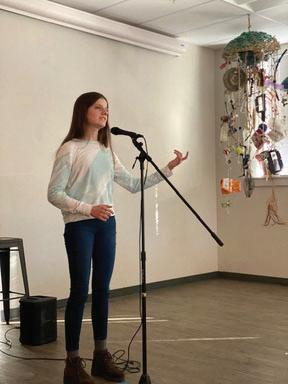
What do Baxter Students are saying...
Because of humanities at Baxter, I became more empathetic as a writer... and learned how to better write about myself.
Because of humanities at Baxter I can put my math skills to use in the context of my community.
ENG 100
Students will address themes related to social contracts and power and work to answer questions about their identities, beliefs, and the formation of societies. Students will master the reading skills of citing appropriate evidence from fiction and non-fiction texts and use the writing process (including outlines and peer revision) to develop claims and formulate well-structured pieces of writing that synthesize big ideas. Students will also participate in multiple whole and small group discussions to learn how to participate in high-level text-based conversations. Standards Assessed: EN in Reading, Writing, and Speaking & Listening.
ENG 201
In this course, students will address themes related to social awareness and work to address questions about their perspectives, understanding of systems, and the role of individuals in creating and sustaining change. Students will choose to answer these questions through the lens of Science Fiction novels. Students will engage in close reading by learning to identify foundational elements of craft and structure and connect them to central themes and/or main ideas. Students will focus on organizing their writing by including strong claims, sophisticated reasoning, and supporting their claims on essential questions. Classroom discourse will give students the opportunity to practice text-based discussions and open-ended questions. Standards Assessed: PR in Reading, Writing, and Speaking & Listening.
ENG 202
Who am I as a reader? Who am I as a writer? What are my stories and why do they matter? What can others’ stories teach us about ourselves and the world? How do different authors from very different backgrounds examine what it means to grow up and find their voices in an often hostile world? How do writers make stylistic choices that enhance meaning? We’ll work to answer these questions through writing and reading a mix of poetry, short stories, and novels of your own choosing. Together, we will work to create a community of readers and writers. Standards Assessed: PR in Reading, Writing, and Speaking & Listening
ENG 260
In this course, students will learn the craft of creative writing. Students will be expected to produce and share their own original work, and analyze and consider how published poets and fiction writers effectively use literary devices. The course will primarily focus on the genres of poetry, the short story, and flash fiction. functions as well as other topics as time allows. The emphasis is on equation solving and its application to the solution of word problems. Prerequisites: English II. Standards Assessed: PR/CB in reading, writing, S & L.
ENG 300
In this course, we will be exploring short works as both readers and writers. Through short works, such as short fiction, personal narratives, opinion pieces and more, we will explore how writers use literary tools to shape the tone and meaning of their works. As we use our reading as a guide to investigate how author’s employ literary techniques, we will work on strengthening our own writing. English II. Standards Assessed: CB Writing, Reading, and Speaking & Listening
ENG 301
Students will address themes related to perspective and address questions about the impact of point of view on the definition of history, the formation of literature, and social relationships between individuals and groups through the lens of Dystopian/Utopian literature. Rigorous close reading focuses students to explore how an author's choice of craft and structure conveys meaning. Students will select essay questions, craft outlines, and develop claims that connect observations across texts. Students will participate in student-facilitated Harkness discussions to address nuanced themes collectively. Standards Assessed: CB Writing, Reading, and Speaking & Listening
ENG302
Through diverse texts and videos, we will consider how communities struggle against forces of oppression and colonization. Assignments will include literary analysis, personal and creative writing, short presentations, and seminar-style discussions. Formerly Multicultural Literature. Standards Assessed: CB Writing, Reading, and Speaking & Listening
ENG 402
In this course, students will explore literary themes and how they relate to the world around them. Students will read personal essays as mentor texts, work to develop their own unique voices, and use these experiences to write their own, original narratives. Then, students will read and discuss modern and classical literary works connected by a common theme. At this level, students will independently engage in close reading practices, expanding upon their knowledge of craft, structure, author's purpose, and theme. Students will plan and lead text-based discussions. Standards Assessed: CB/AD in Writing, Reading, and Speaking & Listening. Optional - Research
ENG 403
In this survey course, students will explore literary eras through the friendships and rivalries of great authors. We will delve into the writing communities that shaped each period and investigate how interpersonal relationships influence artistic movements. Along the way, we may find the answer to such questions as: How did Emerson's and Thoreau's friendship lead to the transcendentalism that revolutionized American literature? Who didn’t Hemingway have beef with? Were the Brontës just jealous of Jane Austen's success? How did these feuds affect society's impression of these authors and how can our friendships shape the future of literature? Prerequisites: English I, 200 level English, 300 level English. Standards Assessed: CB, AD, EX in Writing, Reading, and Speaking & Listening with Research option.

ENG 360
In this course, students will learn the craft of creative writing. Students will produce, workshop, and perform their own original work, as well as analyze and consider how published poets and fiction writers effectively use literary devices. The course will primarily focus on the genres of poetry and fiction writing,, though students may choose independent projects in play or screenwriting, interactive fiction, narrative podcasts, creative nonfiction, or graphic novels. Students should expect to produce a lot of writing. Prerequisites: Creative Writing I. Standards Assessed: CB/AD in Writing, Reading, and Speaking & Listening
ENG 401
Students will address themes related to their social and ethical impact and address questions about their rights, responsibilities, and responses to pressing issues in today's world. Students will read personal essays as mentor texts, work to develop their unique voices, and use these experiences to write their own, original narratives. Then, students will read and discuss non-fiction texts related to current science and technology issues. Students will engage in close reading practices, expanding upon their knowledge of craft, structure, author's purpose, and theme. Students will plan and lead text-based discussions. Standards Assessed: CB/AD in Writing, Reading, and Speaking & Listening, with Research option.
SOC 100
Thocial is course will focus on basic research and the introduction to historical thought. In addition, students will understand how early societies organized themselves to make decisions, solve problems, and produce goods. Students will do this through the study of early civilizations. Standards Assessed: EN in Civics & Government, Historical Thinking, and Economics.
SOC 200
This course will focus on the analysis of historical documents and founding ideals of the United States. In addition, students will examine the American experience from the perspective of groups that historically lacked access to power/resources. Standards Assessed: PR in Civics & Government, Historical Thinking and Economics. *This course is a ME state requirement*.
SOC 300
Students in this course will expand their skills with historical thought and advanced research. Students will focus on the global transfer of goods and wealth and the political implications thereof. Standards Assessed: CB in Historical Thinking, Research, Economics, and Civics & Government.
SOC 415
Students will explore the biological and environmental factors of addiction and violence. We will look at how global, US, and local policies impact a society’s addiction and violence burden. Standards Assessed: AD/EX Civics and Government and Historical Context.

Math 355
The focus of this course is understanding the events in each student's life that will impact them financially. Students will use algebraic and graphical analysis to assess their costs, their sources of income, and how to build a solid financial future. Major projects for this course will focus on understanding job markets and the costs and benefits of college, creating and managing a budget, and planning for taxes and retirement. Students will practice algebraic thinking and create, use, and interpret linear and exponential functions as models for financial situations. Prerequisites: CB in Algebra. Standards Assessed: CB for Research and Economics, CB in Functions.
SOC 405
We will study the rights and responsibilities of people living in, or impacted by the institutions of, the USA, in theory and practice. We will explore identity, power, privilege, and community, working towards learning how we can interact with our political, social, environmental, and economic systems to affect change. Standards Assessed: AD in Historical Thinking, Research, Civics & Government, and Economics.
SOC 455
This course will introduce students to the genocides of the 20th century. Students will explore four genocide case studies: Armenian, the Holocaust, Cambodia, and Rwanda to understand the genocides, their historical context, and the U.S. and international responses to the genocides. Additionally, students will explore the treatment of Native Americans in the United States as a means of learning about the concept of cultural genocide.? This foundation will provide a historical lens as students analyze possible genocide policies and present their solutions to confronting genocide. Standards Assessed: CB/AD Civics & Government and Historical Context.
SOC 456
Portland, Maine is in the midst of a housing crisis. This is a data and research course designed to familiarize students with research methods, data analysis and visualization, and presentation skills. Students will apply these research and data skills to develop an understanding of the housing crisis, one of the biggest challenges facing Portland and many other parts of the state and country. This course emphasizes the collection and analysis of both quantitative and qualitative data, as well as collaboration between our Baxter community and the government agencies, social services providers, nonprofits, advocates, and residents of the wider Portland community. What are the causes of this housing crisis? What are its impacts on individuals, families, institutions, and communities? Prerequisite: American Studies. Standards assessed: CB-EX in humanities.
Studying a world language alongside STEM provides our students with the tools to communicate and problem solve across the globe. By learning another language, students build empathy for others, allowing them to understand and address global issues with their skills in innovation. Baxter?s world language educators recognize the responsibility of preparing our students to enter college and the workforce as empathetic and informed global citizens within our home communities and around the world. As such, language classes at Baxter are built using the latest research in language acquisition and informed by the proficiency levels put forth by the American Council for the Teaching of Foreign Languages (ACTFL).



Mandarin Beginner (Mandarin I)
MAN BGN, year long
Introductory course for beginners emphasizing developmetn of active language learner skills. Students will become familiar with the sound landscape and cultivate a comfort with the unique intonation. Class is desinged using comprehensible input (CI) prioritizing language acquisition over traditional study of grammar to help students acquire language naturally rather than learning it consciously. Standards assessed: PR in Interpersonal and Interpretive Communication.
Mandarin Elementary (Mandarin II)
MAN ELE
Continuation of language acquisition through cultural awareness. Class blends authentic materials and discussion on topics relating to the Chinese speaking world. Students develop a famliarity with listening and responding in the target language and continue to hone their active language learner skills. Standards assessed: CB in Interpersonal, Interpretive, and Presentational Communication.
Mandarin Intermediate (Mandarin III)
MAN INT
Course for motivated learners accessing deeper understanding of language and culture. Through frequent references to current events, social movements, and cultural traditions, students explore a deeper appreciation of the speakers of the language and the language itself. Standards assessed: AD in Interpersonal, Interpretive, and Presentational Communication.
Mandarin Upper-Intermediate (Mandarin IV)
MAN UP
Nuanced course incorporating an emphasis on student initiated topics of study. Student choice drives the direction of discussion while exploring authentic materials on complext cultural issues and current events. Standards assessed: EX in Interpersonal, Interpretive, and Presentational Communication.
SPA BGN, year long
Introductory course for beginners emphasizing the development of active language learner skills. Students will become familiar with the sound landscape and cultivate comfort with the unique intonation. Class is designed to be comprehensible (CI) prioritizing language acquisition over the traditional study of grammar. This method helps students acquire language naturally rather than learning it consciously. Standards assessed: PR in interpersonal and interpretive communication.
SPA ELE
Continuation of language acquisition through cultural awareness. Class blends authentic materials and discussion on topics relating to the Spanish-speaking world. Students develop a familiarity with listening and responding in the target language and continue to hone their active language learner skills. Standards assessed: CB in Interpersonal, Interpretive, and Presentational Communication.
SPA INT
Course for motivated learners accessing a deeper understanding of language and culture. Through frequent references to current events, social movements, and cultural traditions, students explore a deeper appreciation of the speakers of the language and the language itself. Standards Assessed: AD in Interpersonal, Interpretive and Presentational Communi cation.
SPA UP
Nuanced course incorporating an emphasis on studentinitiated topics of study. Student choice drives the direction of discussion while exploring authentic materials on complex cultural issues and current events. Standards Assessed: EX Interpersonal Interpretive, and Presentational
Online Learning of World Language Options possible as electives upon completion of in-person language learning: Arabic, Dutch, Filipino, Greek, Hebrew, Hindi Irish, Japanese, Korean, Latin, Persian, Polish, Portuguese Russian, Swed ish, Turkish
Guided by the Maine Health Learning Standards, we at Baxter partner with local organizations such as Boys to Men and Prevention-ActionChange, to provide rich and interactive programming. Students are connected to our community health partners through our advisory program. In addition to meeting these standards through community partnerships, a lot of work happens in the classroom as well. Students work on long and short term goals, increase self advocacy skills, and reflect on their learning during Flex Friday and student led conferences.
Baxter students are engaged in a health and wellness program through a multi pronged approach. Advisory serves as a micro community anchor for small groups of students.
External partnerships play a role in the general education of all students and also play a role for higher need students who need special care. The culture of academics and educator orientation play a large role in the ongoing health and wellness of our students.
The school counseling program offers educational preventative programs, goal setting, as well as responsive programs for student care There are many outside influences and barriers facing our students today. There will be small group discussion and curriculum with advisor and counselors including digital citizenship and conflict management .
At Baxter, students find a supportive and caring adult and a community of other students in advisory. Baxter students enroll in Advisory, a pass fail course, for every year they are Baxter students; 9th and 10th grade focuses on executive functioning, self awareness and community building while 11th and 12th will focus on college and career planning. At Baxter we believe deeply in the power of community. Students join a group of their peers and an adult advisor and stay in their advisory group for all four years at Baxter.
We live out our advisory mission by consistently revisiting the weekly structure below.
Mondays: Students log into PowerSchool to check their grades and set goals around their academic performance. This is a chance for advisors to work closely with students to meet their own academic goals.
Tuesdays: Students have Intervention and Enrichment. This is a time for them to meet with teachers to get extra support or enrichment in their classes. Students also get study hall time in an advisory.
Wednesdays: Culture and current events are on focus. Here, we tap into the events happening in Maine, the United States, and around the world. We also have Town Halls on Wednesdays, where the whole school joins together to acknowledge and celebrate each other's accomplishments.
Health Connections & Influences Decision Making & Goal Setting Physical Fitness Knowledge
Thursdays: Students meet with their Flex Friday coach to set goals for Friday.
Friday: The curriculum focuses on health and wellness. We learn about various elements of health and well-being and reflect in our wellness journals and with our advisory group to set goals about our health and wellbeing.
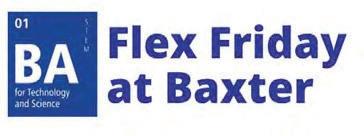
Although every project is unique, there are unifying threads across all cohorts and projects. The Flex Friday pyramid visualizes key components necessary for every project.
Flex Friday Projects are studentinspired and managed, educatorcoached, long-term work. Proposals are presented to a hearing committee for approval. Projects must be ethical, STEM-related and meet a community need; the goals, objectives, and schedule proposed must indicate a pathway to success. Students earn a 1-4 grade, included in the student's GPA.
Community Connections: The project meets an identified community need. Relationships with community partners are nurtured, and authentic audiences or stake holders are identified and included
Daily Skills: Students hone specified skills that are transferable to long-term goals beyond project. Eg: CAD, interviewing skills, lab skills, graphic design, programming, carpentry, editing, social and emotional skills, etc.)
Project Planning: Goal setting, charting progress, breaking down tasks, establishing deadlines, choosing and implementing specific strategies, monitoring and adjusting to solve problems
Process Journal: Weekly intentional reflection on process. Students note progress towards goals, skills acquisition, group work challenges and successes, as well as other discoveries using a consistent platform
Cluster Culture: Presence, accountability, and adherence to coach expectations contribute to a positive cluster culture. Consistent productive student habits, feedback for peers, collaboration and receptivity to coaching also play a role in positive cluster culture
The 9th Grade Experience at Baxter is all about giving incoming students the tools they'll need to succeed in the later years of Flex Friday at Baxter. In service of this mission, students take several field trips to different sites around Portland to get out into the community and learn about art, the environment, technology, and society. Examples from this year include:
Automation at Wilbur’s Chocolate Factory East End Beach: To measure water quality and microplastics in the sand and ocean.
ecomaine: To learn where our trash and recycling go, and how to think responsibly about the waste we create.
Portland Museum of Art: To learn about ancient and contemporary art, and make some art and poetry of our own.
Fore River Sanctuary Preserve: To hike and document what we see in the environment.
Wells Preserve
Our field trips set us up to consider storytelling of each of the locations to which we traveled. During each field trip, we consider the following questions:
If you were to make a podcast about today's field trip, what would the community impact be? What project management strategies would you use?
What writing style and podcast format would make the most sense?
Our students study writing, community impact, and project management.
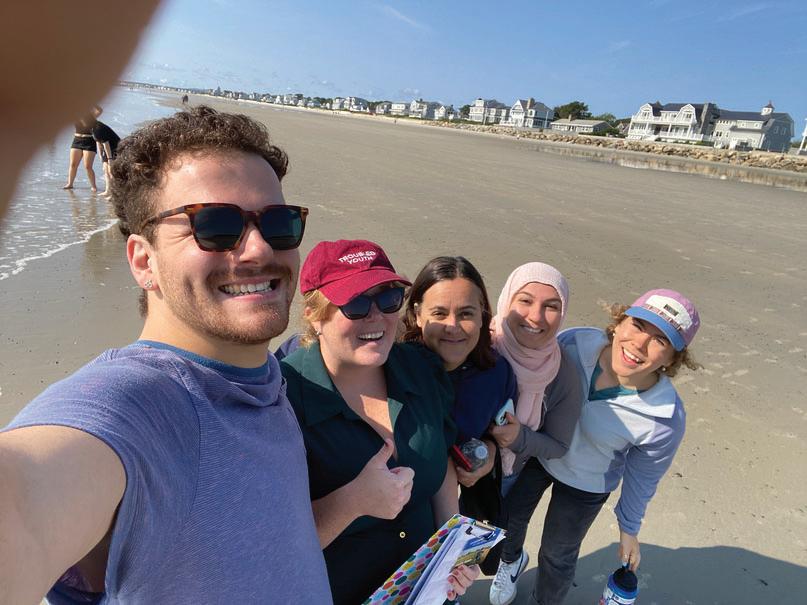



Flex Friday helps students foster skills such as these for students to achieve their goals:
Time management
Responsibility
Creativity
Collaboration
Flex Friday connects students to their community's needs: Connects students to the local and global community. Investigation of real-world problems serves as a vehicle for deep learning.
Flex Friday encourages risk-taking and trying something outside of a student's comfort zone. Some of the most exciting learning happens when a student who has tried hard at something new ends up with an unplanned outcome. Success happens when students feel the freedom to make mistakes and try new things. In Flex Friday, students have the freedom to problem solve in nonlinear ways, using multiple possibilities for refining their thinking. These projects invite collaboration, feedback, support, and interdependence.
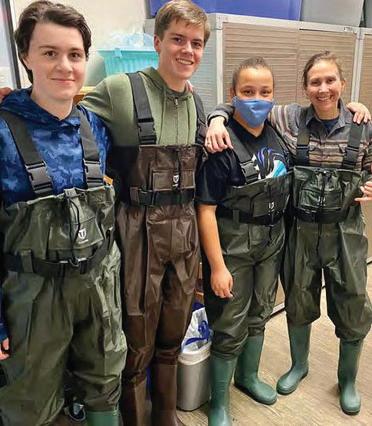

Baxter Academy offers a unique chess program taught by US Chess Master Majur Jurac from South Sudan. This rare opportunity will engage novice and experienced players alike. Students will have the opportunity to join a global community in a game that is over 1500 years old. While the international chess federation (FIDE) host teams from 180 countries. STEM programmers continue to develop artificial intelligence that can challenge evolving World Chess Masters. This will be an ongoing battle. In 2020, e-sport teams began signing players for the first time.
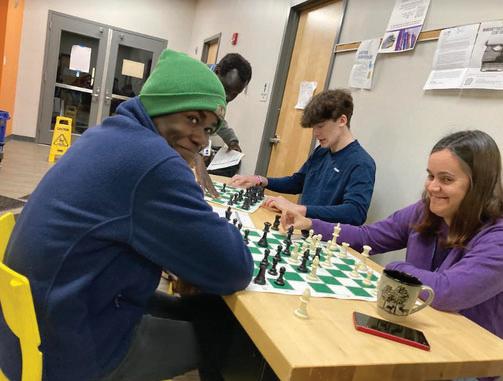
Des Ches100
Students will learn the fundamentals of the game, including increasing concentration and strategic thinking. Students will learn include the basics of coordinates, logic, strategy, executive functioning, and predicting a variety of outcomes. Students will learn rapid decisionmaking under timed conditions, evaluate alternatives, and learn many ways to win through instruction and opportunities to play opponents in the classroom. The mechanics of official chess tournaments will be learned. Students should expect to learn about chess, play chess, and reflect on their learning across the semester.
Baxter attracts experts from various STEM fields. Every year, over 35 STEM speakers are brought in for school-wide weekly events, helping to grow our students’ professional network. In addition to this, classroom teachers also bring in special speakers. Some classes go on field trips to local industries including engineering firms, universities, art studios, and museums. We offer special courses to enrich student experience outside of the standards track.
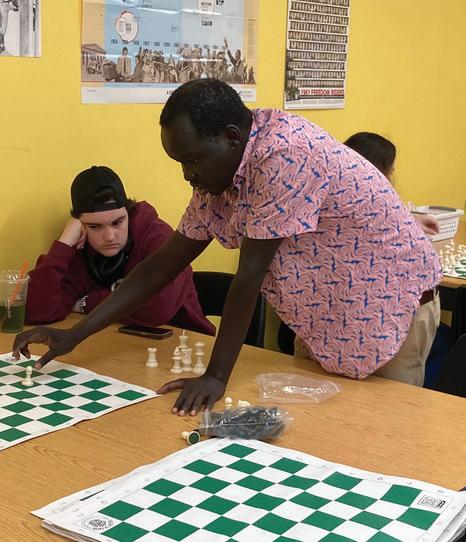
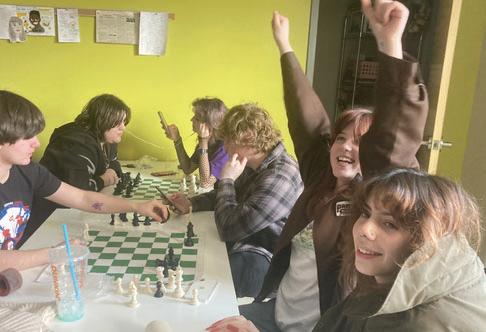
Des Ches200
Building on the strategy learning from Chess I. Students should expect to be challenged by their peers in tactical thinking, planning long term strategies, and be capable of challenging their peers in class, in school, or at Baxter Chess Tournaments, If interested, students may be prepared to play competitively in ranked chess matches.

Phil Coupe, Founder of Revision Energy at a Class of 2027 field trip at the Wells Reserve
Baxter's motto is "The real world starts now." One of the ways that we try to connect our students with real-world applications of the content and skills that they learn in the classroom is through our Speaker Series. Each Friday during the school year, we host short presentations by individuals and organizations who are doing interesting work that connects with Baxter's STEM mission. Below you will find a sampling of the 2023-2024 Speaker Series presenters who have come to share their insights and experiences with Baxter’s students.

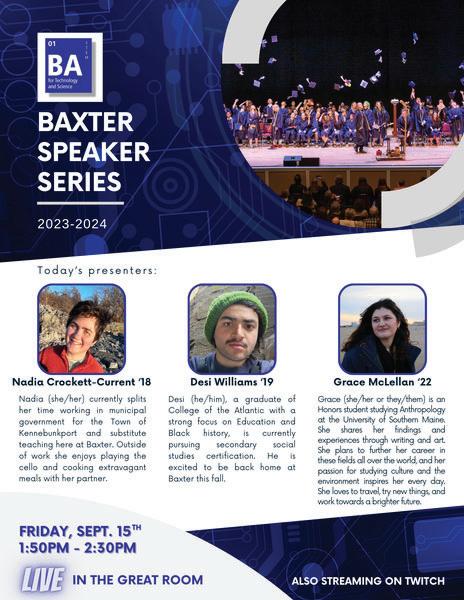
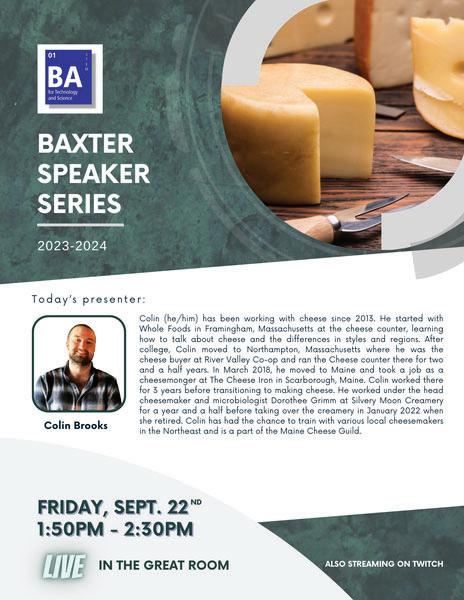
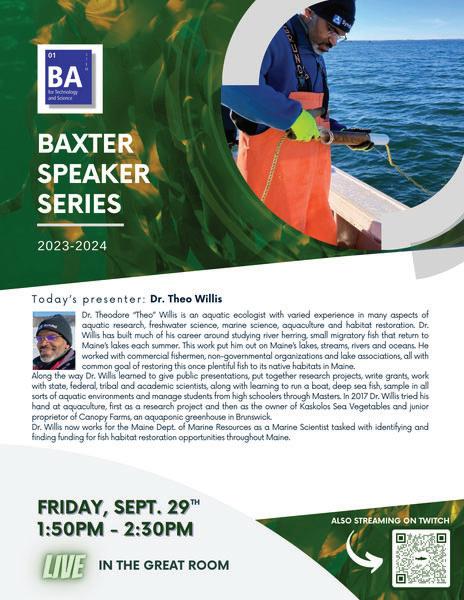
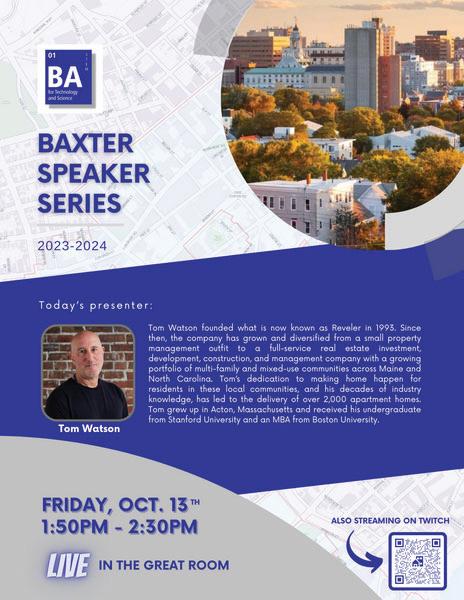
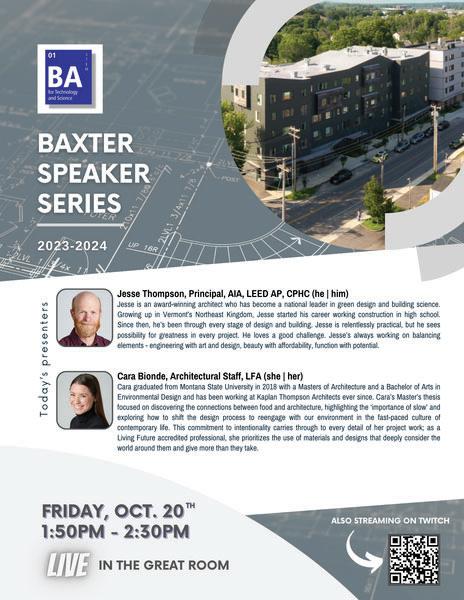
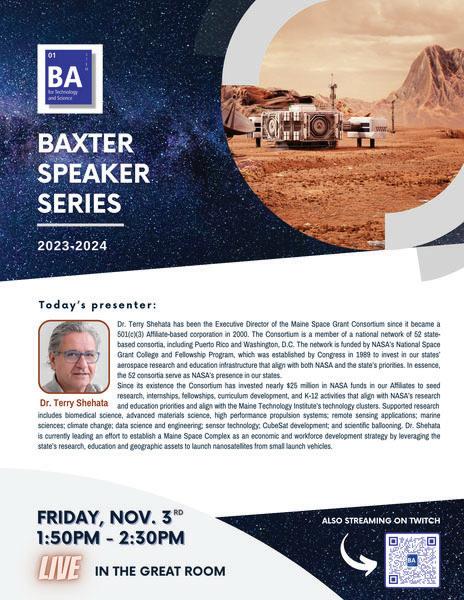


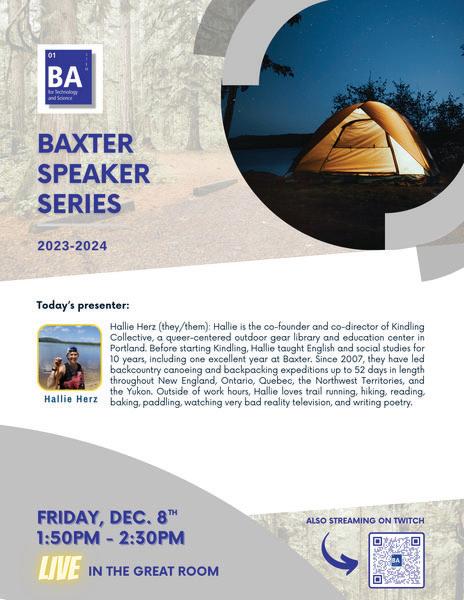
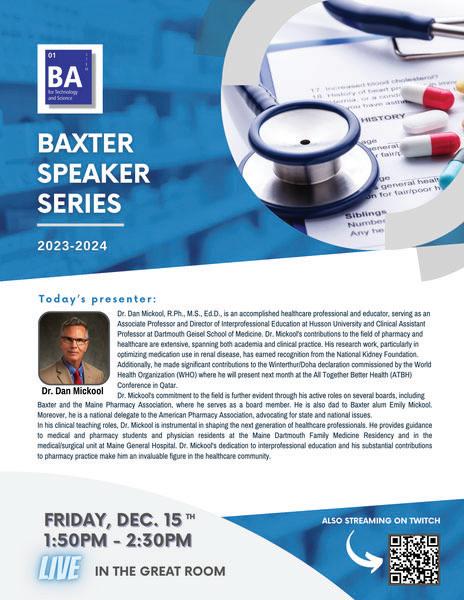
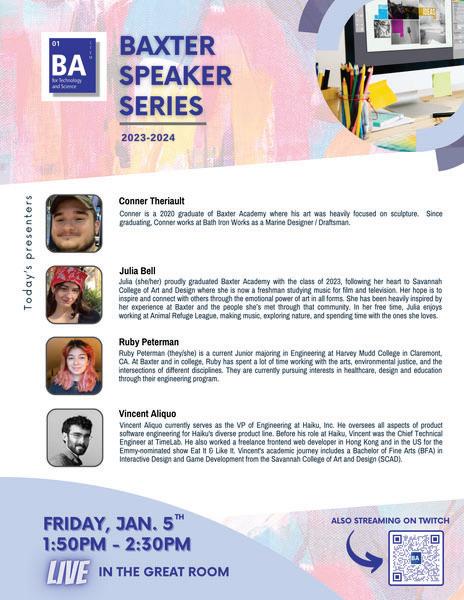
Baxter Academy holds all students to high standards of academic integrity. Our community expects each member to honor the principles of academic and personal honesty and authenticity. The high level of student-led work and collaboration calls on all members to be true to themselves and to those we work with and serve. Much of student work is done not merely for grade books, but for real-world benefit. Thus, the bar for ethical and responsible academic contribution is high at Baxter as our student's work holds real value for our community.
Progress reports are issued mid-semester. Semester report cards are issued at the end of each semester. These reports, along with regular educator updates of no less than every two weeks, are used to help students and families stay informed and collaborate with Baxter as needed to support student success. Specific dates for progress reports and report cards will be shared on the school calendar. Transcripts are permanent records and report only final standards and grades.
The Baxter transcript marks a student's progress on standards and reports student achievement levels in their courses. Additionally, a student's Flex Friday project description, each year, is also reported on a student's official transcript. The GPA is derived from evaluation by course.
Student grades for each enrolled course are averaged to configure their overall Grade Point Average at the end of each semester. Baxter does not use GPA to report class rank.
Baxter courses increase in rigor as a student moves from level 100 to 200 to 300 and 400 and beyond.
Students will successfully courses to meet proficiency in the standards and indicators of our academic program (competency benchmark at minimum); a third of a student's academic journey consists of core courses and the remaining is uniquely tailored to the student's exploratory and concentration interests, as guided by Baxter mentors and coaches. Baxter's Academic program of studies provides students with the following means to achieve graduation requirements:
-4 years of Flex Friday
-4 years of Mathematics
-4 years of Science
-3 years of Humanities
-1 year of Art
-1.5 year of Design
-1.5 year of World Language
-3 years of electives to concentrate/explore
-4 years of Advisory
Students must be enrolled in Flex Friday, Advisory, and 5 courses at Baxter for each semester.
A two-week add/drop period at the beginning of each semester allows a student to fine-tune their academic program without a record on the student's transcript. Students can initiate add/drop by meeting with their counselor, who will investigate approvals with appropriate parties, including sending and receiving teachers, and the department chair. Students are responsible for making up work that they have missed in the first two weeks of the course, as required by the teacher. Without the expressed consent of the administration, after the first progress report is released, a W will appear on a student's transcript for a dropped course and courses may not be added at this time. Students with extenuating circumstances may appeal to the administration to add a course in exchange for a dropped course after the first progress report.
Juniors and Seniors are eligible to take up to 2semester college courses per year in lieu of Baxter courses. Eligibility is determined by standards proficiency. College transcripts will be issued along with Baxter transcripts. Early College Courses do not contribute to a student's GPA.
Using the new student's sending school transcript, students will be awarded standards and courses as applicable.
At the time of publication, we made a reasonable effort for the accuracy of information. This publication does not contain all of the policies, procedures, rules, regulations, and academic requirements of Baxter. Changes or additions may be made to policies, procedures, rules, regulations, and academic requirements without prior notice. When an academic requirement is made, it is not made retroactive unless the change is of benefit to the student and is achievable.
Baxter acts in accordance with the Family Education Rights and Privacy Act (FERPA). The parent/guardian rights to student records transfer to students once they turn 18 or attend a school beyond high school. Baxter will give full rights under the Act to either parent/guardian unless provided with evidence of a court order, State statute or legally binding document relating to divorce, separation, or custody, that specifically revokes these rights. A copy of such a document will be filed with the counselor in the student's record.
Baxter graduates its seniors annually in June. Confirmation of graduation for the following school year begins at the end of a student's junior year first semester, or 18 months in advance of graduation.
Graduating seniors have the ability to earn Baxter Distinguished Scholars designation on their diploma. Applications for Distinguished scholars are due by the end of the second semester of a student’s junior year. Students interested in a Baxter Distinguished Scholar designation on their diploma will assemble a portfolio to support their candidacy. For more details, please see Baxter's Head of School or Assistant Principal, with whom rests the final decision for promoting a candidate to a Baxter Distinguished Scholar. Distinguished Baxter scholars are those students who have demonstrated strong authenticity, critical thinking, agency, collaboration, voice and leadership in the following four ways.
I.Competitive external exhibitions with successful participation (MSSF, Robotics competition, other competitive STEM organization)
II. Academic Concentrationdemonstrated evidence of concentrated study with significant elective study in the area.
III. Internship relevant to their area of academic concentration.
IV. Demonstrated leadership for at least 10-12th grade of their years at Baxter; evidence of initiating and participating in leadership.
V. Academics in service - Student has applied their academic studies, particularly their area of concentration in service hours to their community or a community organization.
I can genuinely say that coming into the hallways here that my passion for teaching has been re-ignited and I am by far, having the most fun that I have ever had teaching at any school. Period. -Baxter Teacher
Your counselors at Baxter are here to help guide you on your next steps after high school. We at Baxter believe there are many different ways to path your success. Although we are a college preparatory school, we also prepare you for the real world. So no matter what your next steps will be, we are there to support and guide you.

9th Grade:
Exploring interests
Meet counselor
Think about life after Baxter
10th Grade:
Meet with Counselor
Take PSATs
Attend College/Career Fairs
Take Rigorous Couses
11th Grade:
Create College List
Take PSATs again
Take SATs
Tour Schools
Attend Info Sessions
Meet with Counselor
Keep high rigor
Junior Meetings
12th Grade: Senior Seminar
Narrow down List
Meet with Counselor
Take SAT in Fall if needed
Request Recommendations
Complete Applications
Send SAT scores if needed
Receive Admissions
Decisions
Deposit!
Students are eligible to take college classes at many Maine Colleges and Universities tuition-free. Eligible students are allowed to take 12 credits an academic year for free each fiscal year (July-June). Students may be responsible for purchasing any books/materials required for their classes. Parental approval is required for registration. Baxter students should achieve (at least) Competency Benchmark in the areas they plan to take college classes in before enrolling in the Early College program. Availability is also guided by prerequisites determined by the college/university at their discretion. Baxter Counselors are available to help with class selection, navigating prerequisites, and the scheduling and registration process. Standards and GPA will not be counted for Graduation Requirements or Baxter GPA. Higher educational institutions will issue a transcript for all classes.
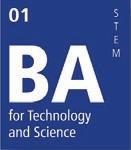
Version 4.4b (for 2024-2025 academic calendar year)
Academicrecordsgiveaviewofastudent’sjourneyandgrowth.Studentsandfamiliescanaccessrecords toviewregularupdatesprovidedbyeducatorsinPowerSchool.Formalprogressreportsareissued mid-semester.Reportcardsissuedateachsemester’sendwillbeusedfortranscripts.
evaluationby course
Studentsearnagradeforeachcoursebasedontheirprogresstoward meetingthe requirementsofthegradedelements.
TranscendsCourseExpectations
4.0
3.5
3.0
Thestudentpushedbeyondcourseexpectationsin skilland/orcontentmasteryandpotentially reachedhigherstandardsofthecourseandadded deeppersonalandcommunityconnection.
BetterthanMeetsCourseExpectations
Thestudentiswellpreparedandwellpracticedfor thenextcourseinthesequence,andmayhave alreadyexhibitedsomeoftheskillsand/orcontent masteryexpectedinthenextcourse.
MeetsCourseExpectations
Thestudentispreparedforthenextcourseinthe sequenceandhasmetexpectationsinthegraded elementsofthecourse.
SatisfiesCourseExpectationswithGreater
Proficiency
2.5
evaluationby standard
Studentlearningisdeterminedbyprogresstoward thestandardsassociatedwithacourse.Thelevelof achievementdependsonthecomplexityofthe course.
Excelling (400+levelcourse)
Thestudentdemonstratedahigh levelofcomplexity,sophistication, originality,depth,synthesisin applicationofcourse.
Advancing (400levelcourse)
Thestudentdemonstrated complexity,sophistication, originality,depth,synthesisin applicationofcourse.
CompetencyBenchmark (300levelcourse)
2.0
1.0
Thestudentmayadvancetothenextcourseinthe sequence.Thestudentcouldusegreaterpracticein askilland/ordemonstrategreaterknowledgeor contentmasteryongradedelements.
SatisfiesCourseExpectations
Thestudentisminimallypreparedforthenext courseinthesequence.Thestudentlikelyneedsto makeupshortcomingsinsomegradedelements.
DoesNotSatisfyCourseExpectations
Thestudentisnotsufficientlypreparedforthenext courseinthesequence.Thestudentwillneedto repeattheclass.
GPAsaredeterminedbycourseevaluations.
Weusenumberstocommunicategradesclearlytosecondary institutions,students,andfamilies.Thisishowtherestofthe worldseesourGPA.
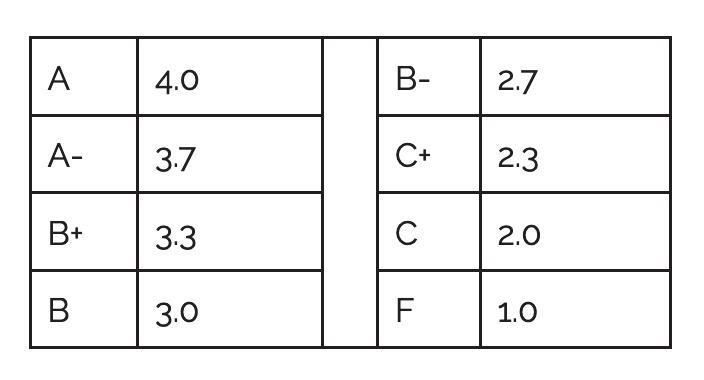
Thestudenthasconsistently demonstratedunderstandingatthe levelrequiredforallBaxter graduates.
Progressing (200levelcourse)
Thestudenthasacquiredadeeper understandingofthestandard,well onthewaytobenchmark,butis notquitethere.
Entering (100levelcourse)
Thestudenthasdemonstrateda basicorintroductory understandingoftheskillsand contentofthestandard.
Studentsmayofferevidencethatis Beyond Assessment (BA)ofrubricexpectations.Some studentsmayalsoearnanevaluationofNoEvidence (NE).For300-levelcoursesthestandardstargetis competencybenchmark.
Graduationisdeterminedbysuccessfulcompletionofthecourseofstudies,whichholdstheappropriatestandards.
Matt Barnes
Media Arts
BA Notre Dame College
Tyler Beaulieu
Data & Enrollment Manager
BA Alfred University
Chris Bertelsen Humanities
BA Colby College
Shiho Burnham
Mathematics
BA University of S. Maine
MS University of S. Maine
Elisa Cano
Spanish
MS, Univesrsity of Vigo
MS, University of Barvelona
David Connor
Media Arts & Fabrications
BA University Maine Orono
MAT University S. Maine
Amos Cooper
Information Technology
BA Susquehanna University
Michelle Doherty
Front Office Manager
Mystic Valley Charter School
Leah Douglass
Humanities
BA U Maine Farmington
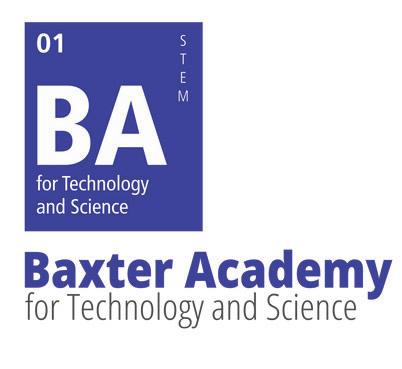
185 Lancaster Street
Portland, ME 04101 207699-5500 www..baxteracademy.org CEEB:200818
Ernie Easter
Educational Technician
BS University Maine Orono
Andrew Fumarola
Science
BA Colby College
Debra Gagne
Social Worker
MSW Univeristy of Southern Maine
Eli Hersey Powers Humanities
Pomona College
Jasmine Holland
Business Manager
Univ. Maine Augusta
Majur Juac Chess
Eric Kawamoto
Computer Science
BS California Institute Tech
MA Harvard University
PhD Harvard University
Emily Kelly Counselor
BS Framingham State Univ
MEd U Mass Amherst
EdS U Mass Amherst
Anna Klein-Christie
Executive Director
BA Kenyon College
Charlie Koch
Counselor
BA Trinity College
MS University S. Maine
Dustin LeVasseur
Music & Media Arts
BA University S. Maine
MA Columbia University
Rory Lowe Science
BA Colorado College
Alan Lukas
Engineering
BS & MS M.I.T.
Laura Parks
Director of Special Ed
BA Wheelock College
MEd University S. Maine
Peter Moxhay
Mathemathics
BA Brown University
PhD U of Minnesota
Wiley Muller
Engineering
BA Univ. of Tennessee
MEd U. Southern Maine
Enyue Li Mandarin
Shanxi Normal College
Cicy Po
Head of School
BA Skidmore College
MEd Harvard University
EdD Boston College
Eric Poulin
Special Education
BA U of MO, Columbia
David Rawson
Mathmatics/Science
BA University of Maine
Pam Rawson
Mathemathics
BS University of Lowell
Golsin Rashid Science
BS College of Technology Kirkuk, Iraq
Andrew Ritter
Science
BS Hobart College
Jorge Rodriguez
Mathematics
BS, BA Drexel University
MEd National University
Anna Schwarz
Special Education
BA Sarah Lawrence College
M.Sp. Ed. U. Southern Maine
Kate Strait
Science
BA University of New England
MA University of New Hampshire
Sunny Stutzman
Fabrication/Design
BA UM Farmington
AS Art Institute of Pittsburgh
Billy Wall
Special Education
BA U. Southern Maine
Alex Waters
Assistant Principal
BA Dartmouth College
MAT Sacred Heart U
John Wensman
Humanities
BA Univ. of Minnesota
MAT Brown University
Caro Woodard Humanities
University of Georgia